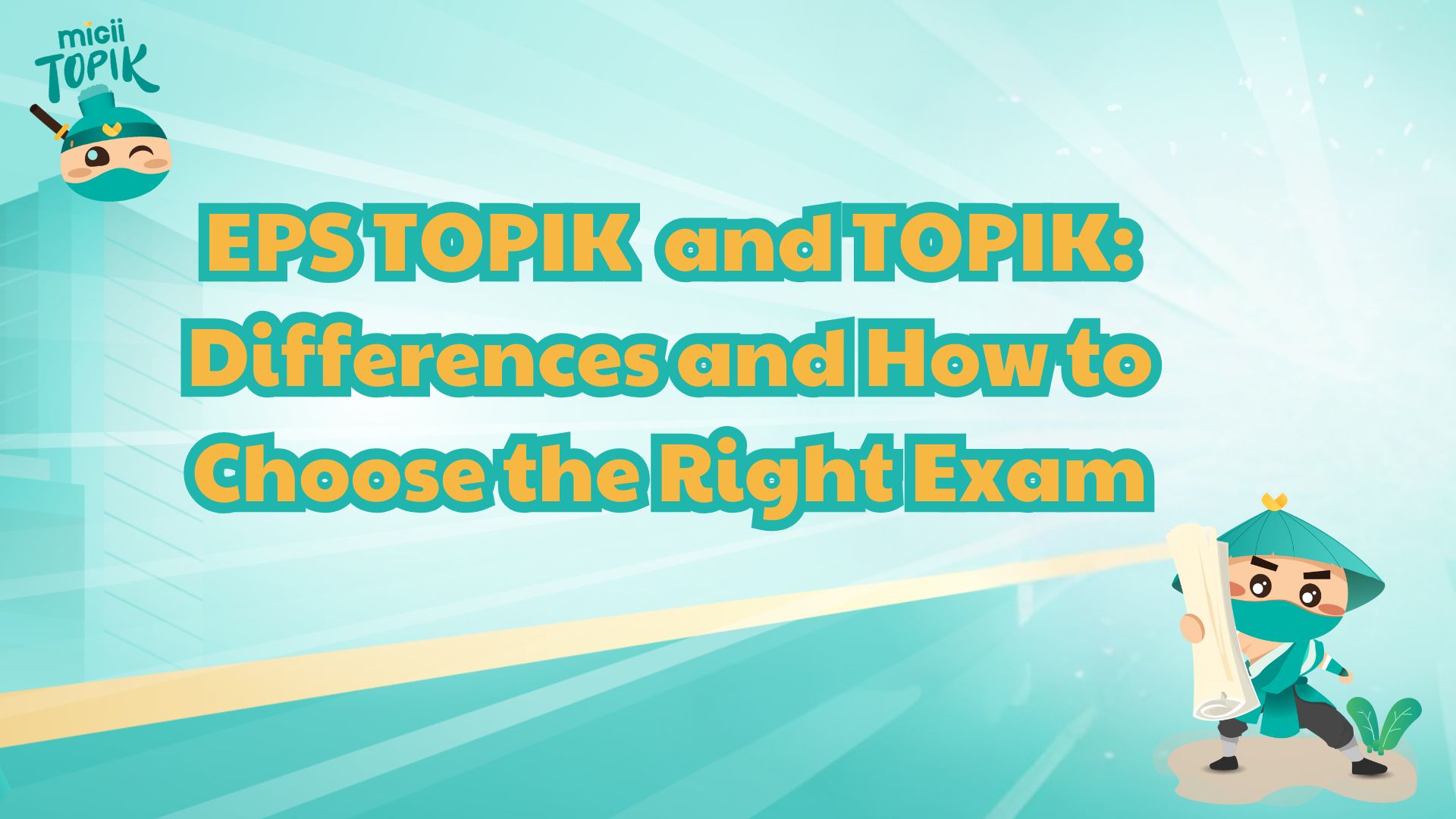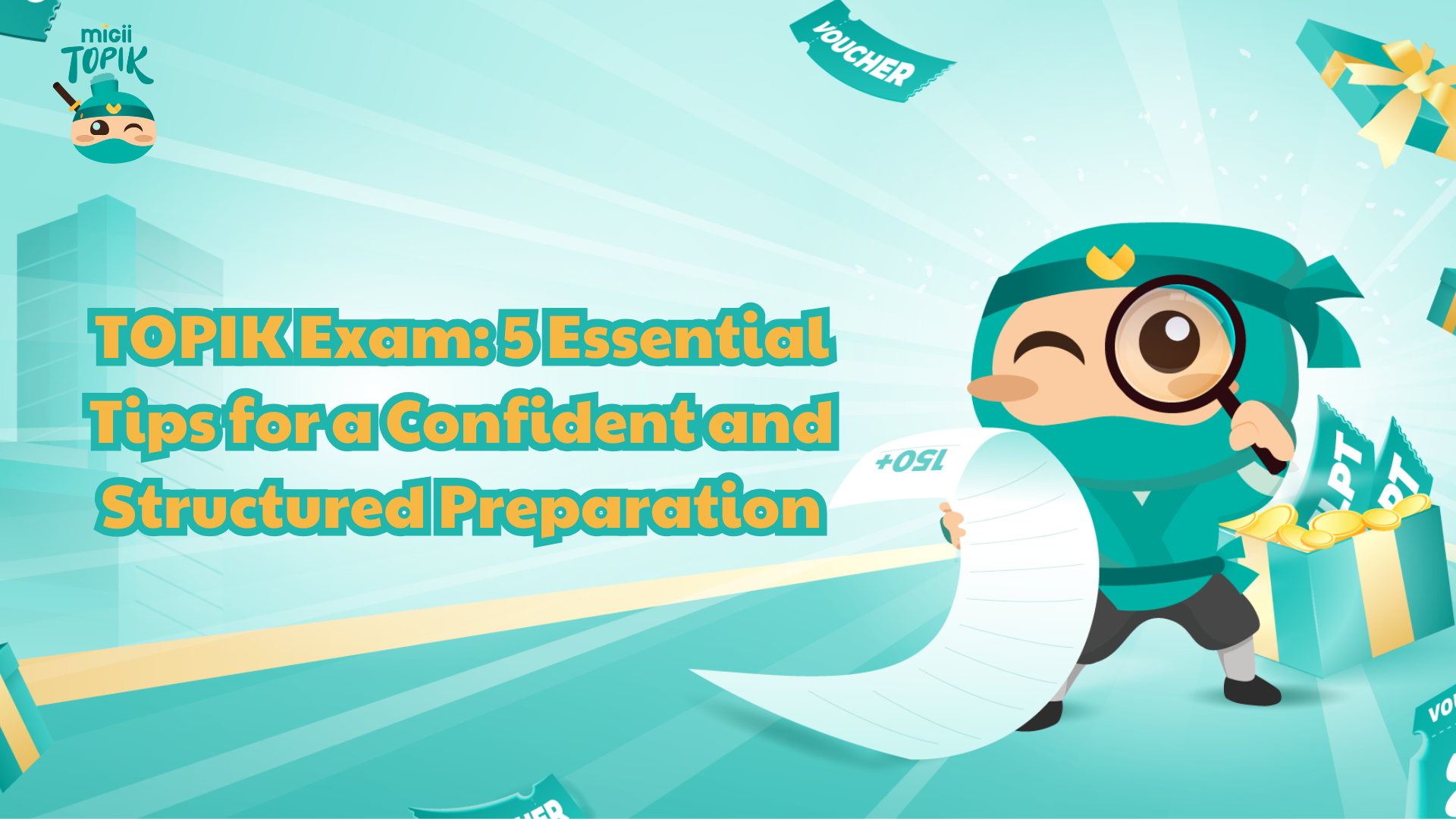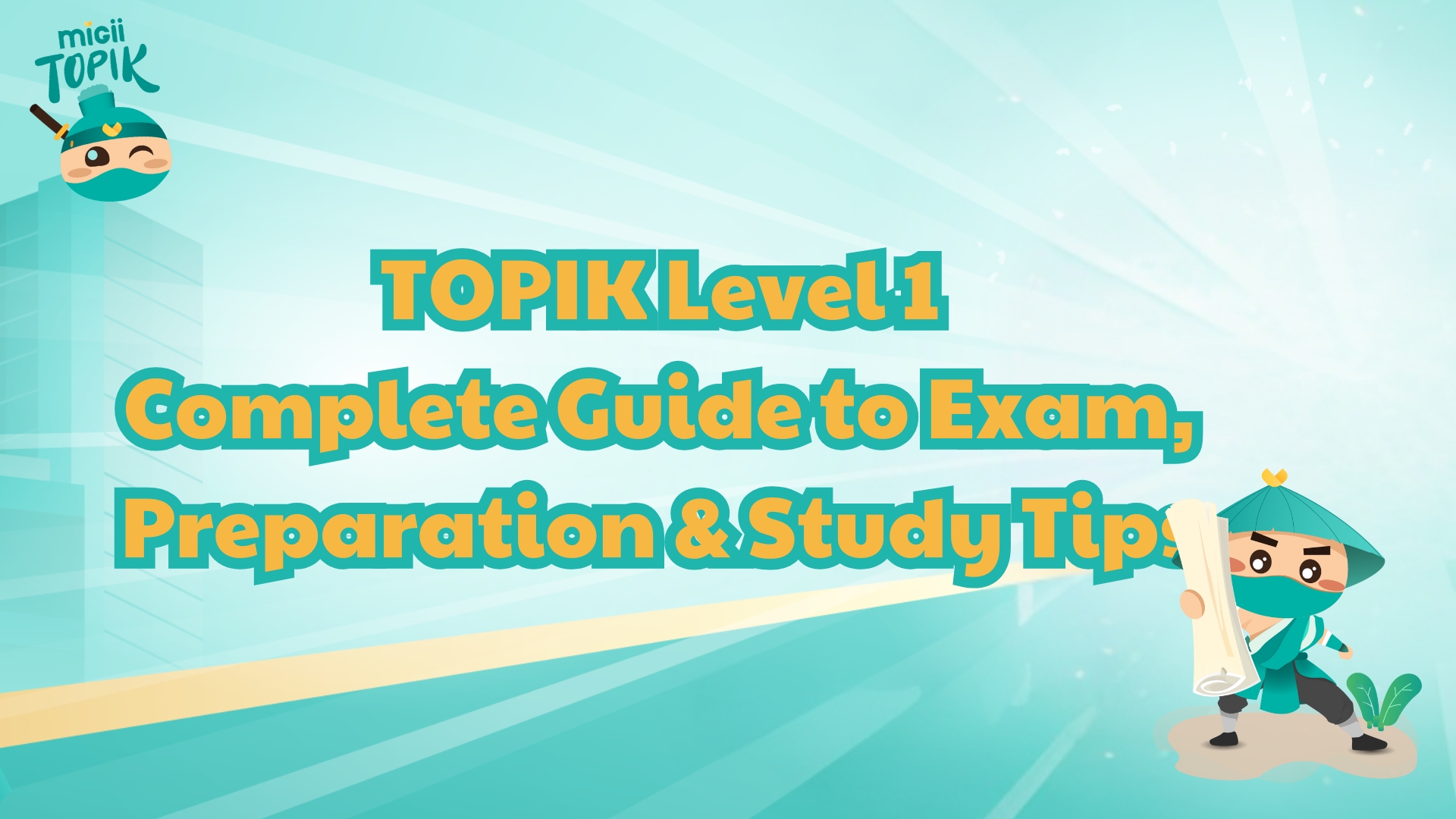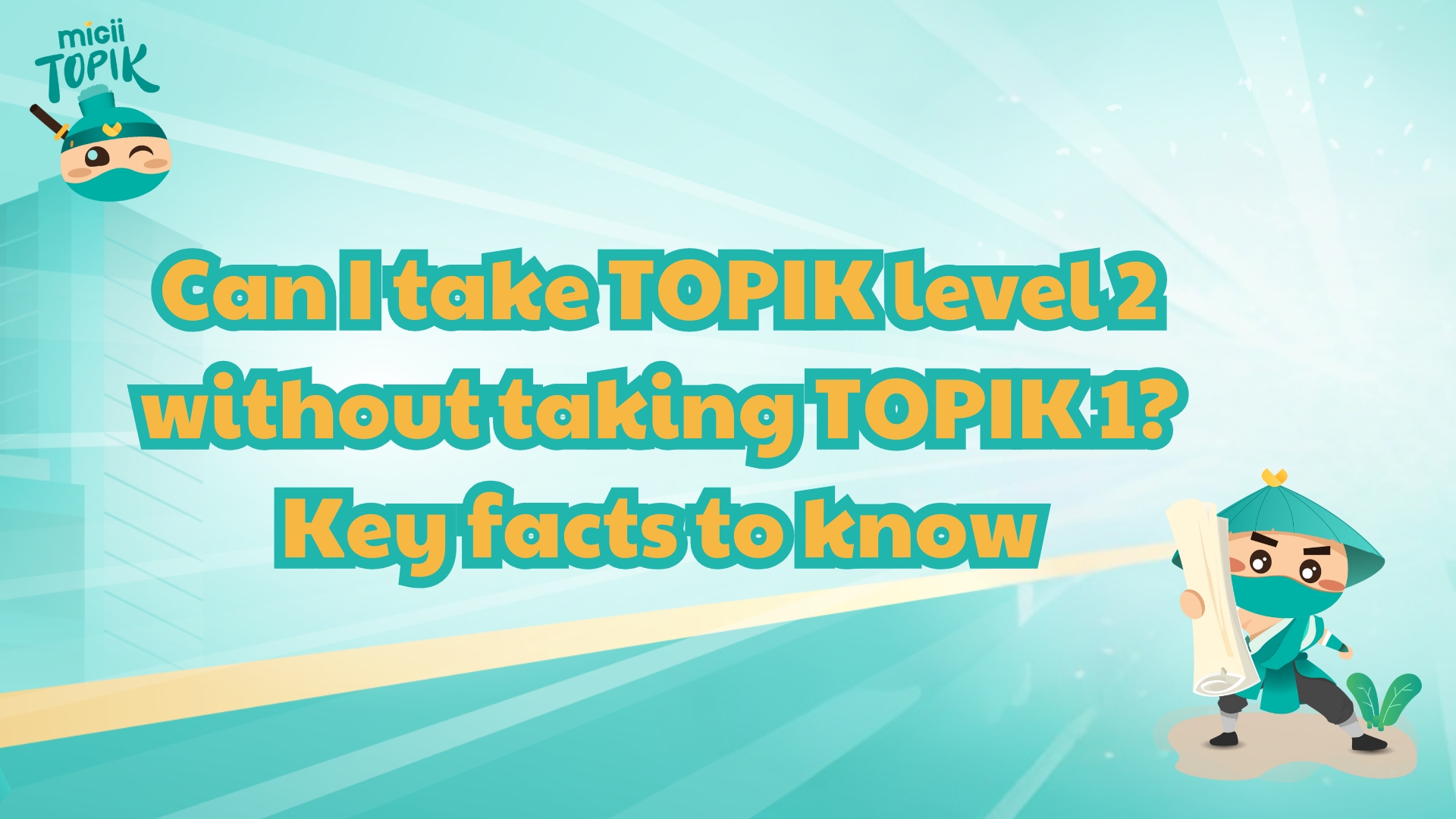Understanding TOPIK scoring is crucial for exam success, as it determines your proficiency and eligibility for a TOPIK certificate. Knowing the TOPIK 1 passing score, TOPIK 2 scores, and overall TOPIK score range helps you set goals, focus on key areas, and track progress across TOPIK Korean test levels, opening doors to scholarships, jobs, and academic opportunities.
TOPIK Test Levels and Scoring System
The TOPIK Korean test levels are divided into two main categories: TOPIK I and TOPIK II, covering a wide range of proficiency from beginners to advanced learners.
- TOPIK I (Level 1–2): Designed for beginners, this stage evaluates basic grammar, vocabulary, and the ability to handle everyday situations.
- TOPIK II (Level 3–6): Aimed at intermediate to advanced learners, this stage measures reading, listening, and writing at a higher level, with increasing complexity as you progress from Level 3 up to Level 6.
Breakdown of TOPIK Level Scores
- TOPIK Level 1 Score: Learners need at least 80 points out of 200 to pass. Achieving this means you can handle basic communication in daily life.
- TOPIK Level 2 Score: Requires 140 points out of 200. This proves you can manage simple tasks such as shopping, ordering food, and basic work interactions.
- TOPIK Level 4 Score: Requires around 150 points out of 300. At this stage, learners can discuss familiar social topics, read simple articles, and write short essays.
- TOPIK 5 Score: Typically 190 points or higher out of 300, demonstrating advanced proficiency. With this level, learners can engage in academic or professional discussions and read more complex materials.
- TOPIK Level 6: The highest proficiency, usually above 230 points out of 300, where learners can express ideas fluently and handle professional or academic tasks with near-native competence.
Minimum TOPIK Passing Score
The TOPIK passing score depends on the level you aim for:
- TOPIK 1 Passing Score (Level 1–2): 80–140 points.
- TOPIK 2 Scores (Level 3–6): From 120 points (Level 3) to above 230 points (Level 6).
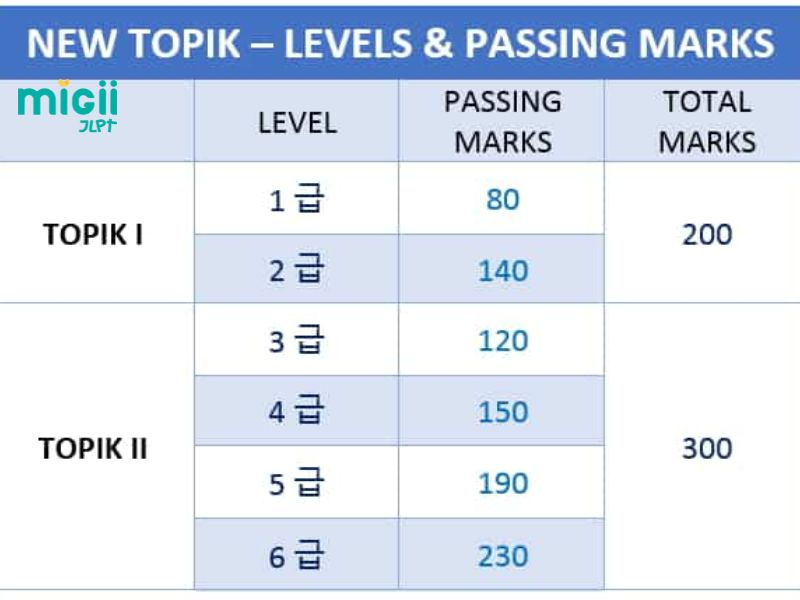
TOPIK Test Levels and Scoring System
Understanding TOPIK 1 Scores
The TOPIK 1 score represents the foundation of the entire TOPIK scoring system. It is designed for beginners who are just starting their Korean language journey. Unlike higher levels, TOPIK I does not include writing; it only evaluates listening and reading skills, making it more approachable for first-time test-takers.
The test is scored out of 200 points in total:
- Listening: 100 points
- Reading: 100 points
To earn a certificate at this level, you must reach at least the TOPIK 1 passing score:
- Level 1: Requires 80–139 points. This proves you can handle basic expressions, introduce yourself, shop, and engage in simple daily conversations.
- Level 2: Requires 140 points or higher. At this stage, learners demonstrate the ability to communicate in broader situations, such as traveling, asking for information, or performing basic work-related tasks.
Reaching the desired TOPIK exam score in this stage is very possible with consistent practice. Here are some strategies:
- Focus on Vocabulary: Build a solid base of the most common 1,500–2,000 words. These cover most questions in the listening and reading sections.
- Practice Listening Daily: Dedicate 20–30 minutes a day to short dialogues, songs, or podcasts. This improves comprehension speed for the listening section.
- Strengthen Reading Habits: Practice reading simple articles, menus, or signs to prepare for the TOPIK reading time during the test.
- Take Mock Tests: Simulate real exam conditions using past papers. This helps you manage time and predict your possible TOPIK exam score.
- Review Mistakes: Each incorrect answer shows a gap in your knowledge. Analyzing them carefully prevents repeated errors.
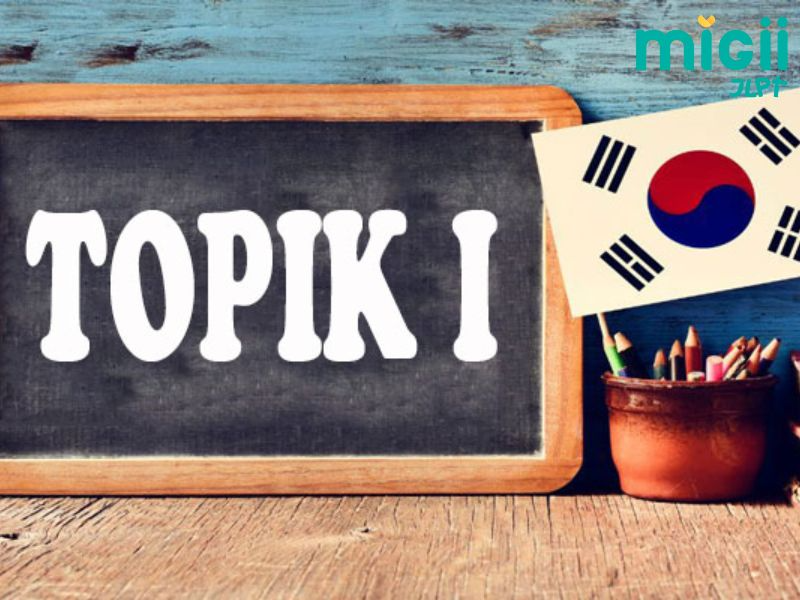
A clear breakdown of TOPIK 1 scoring, showing score ranges, levels (Beginner 1 and 2)
Understanding TOPIK 2 Scores
The TOPIK 2 scores play a much bigger role in academic and professional settings, as this test measures whether you can use Korean effectively in real-world and academic contexts. Unlike TOPIK I, which only covers listening and reading, TOPIK II evaluates listening, reading, and writing together, making it more comprehensive and challenging.
The total TOPIK exam score for TOPIK II is 300 points, divided into three sections:
- Listening: 100 points
- Reading: 100 points
- Writing: 100 points
Your overall TOPIK scoring determines your certificate level:
- Level 3: 120–149 points
- Level 4: 150–189 points (known as the TOPIK level 4 score)
- Level 5: 190–229 points (referred to as the TOPIK 5 score)
- Level 6: 230–300 points, the highest in the TOPIK score range
Because TOPIK II is more advanced, study time should be longer and more focused than for TOPIK I. A general guideline is:
- 300–400 study hours for Level 3–4 goals
- 500+ hours for Level 5–6 goals
Effective TOPIK 2 time management during the exam is crucial. Here are strategies to apply:
- Spend 25–30 minutes on the listening section.
- Allocate 60 minutes to reading, which has many detailed comprehension questions.
- Dedicate 60–70 minutes to writing, ensuring enough time to structure essays clearly.
To qualify for an advanced TOPIK certificate, consistency is key. Learners should:
- Build advanced vocabulary and grammar patterns.
- Practice essay writing for the writing section, focusing on coherence and logical flow.
- Use mock exams to measure progress and predict your TOPIK test scores.

Clear explanation of TOPIK 2 scoring, levels (Intermediate to Advanced)
Components of TOPIK Scoring
The TOPIK scoring system is built around three essential components that evaluate a learner’s full language ability: Reading, Listening, and Writing. Each section contributes differently to the final TOPIK exam score, so understanding how to approach them is essential.
Reading Section
The reading section tests comprehension of texts ranging from short ads to academic passages. Learners must read quickly and identify main ideas, supporting details, and vocabulary in context. A typical TOPIK reading time is 60 minutes. To optimize performance:
- Skim the text first to understand the structure.
- Focus on key words in the question and locate them in the passage.
- Practice reading under timed conditions to simulate real exam pressure.
Listening Section
This part evaluates how well you understand spoken Korean in daily and professional contexts. With 100 points available, it requires sharp focus. Strategies include:
- Listening to Korean news, dramas, and podcasts daily.
- Taking notes on key points during practice tests.
- Training your ear for accents and fast speech patterns.
Writing Section
Exclusive to TOPIK II, writing measures your ability to construct logical sentences, express opinions, and write essays. It is often the most difficult part for learners. To improve:
- Memorize essential connectors and sentence endings.
- Practice short paragraphs before attempting full essays.
- Analyze sample essays that received high TOPIK test scores.
How Each Section Contributes to the Overall TOPIK Exam Score
- Listening: Tests your real-time comprehension and accounts for one-third of the score.
- Reading: Measures vocabulary, grammar, and comprehension, also one-third of the score.
- Writing: Assesses critical thinking and clarity, crucial for reaching advanced levels like the TOPIK level 4 score or TOPIK 5 score.
Mastering all three ensures balance across your TOPIK level scores and gives you the best chance at reaching your desired TOPIK passing score.
Below are download links for some sample test questions from elementary to advanced level, you can self-study to improve your score:
Đề Topik sơ cấp: Đề Topik Sơ cấp
Đề Topik Trung cấp: Đề Topik Trung cấp
Đề Topik Cao cấp: Đề Topik Cao cấp
Score Interpretation and Certificate
A TOPIK certificate is awarded based on your TOPIK scoring and serves as official proof of your Korean language proficiency. The certificate is valid for two years and is recognized by Korean universities, employers, and immigration offices.
- TOPIK I (Level 1–2): Basic communication skills for daily life.
- TOPIK II (Level 3–6): Practical to advanced communication, academic readiness, and professional fluency.
Comparison of TOPIK Score Range Across Different Levels
- TOPIK 1 Passing Score (Level 1): 80–139 points
- TOPIK Level 2 Score: 140–199 points
- TOPIK Level 3 Score: 120–149 points
- TOPIK Level 4 Score: 150–189 points
- TOPIK 5 Score: 190–229 points
- Level 6: 230–300 points
How TOPIK Test Scores Translate into Real-World Opportunities
- Education: Korean universities often require a TOPIK level 4 score or higher for admission.
- Employment: Companies in Korea may expect at least TOPIK 2 scores for professional roles.
- Immigration: Higher scores increase eligibility for permanent residency and work visas.
Achieving a strong TOPIK exam score not only validates your Korean skills but also expands your academic and career opportunities.
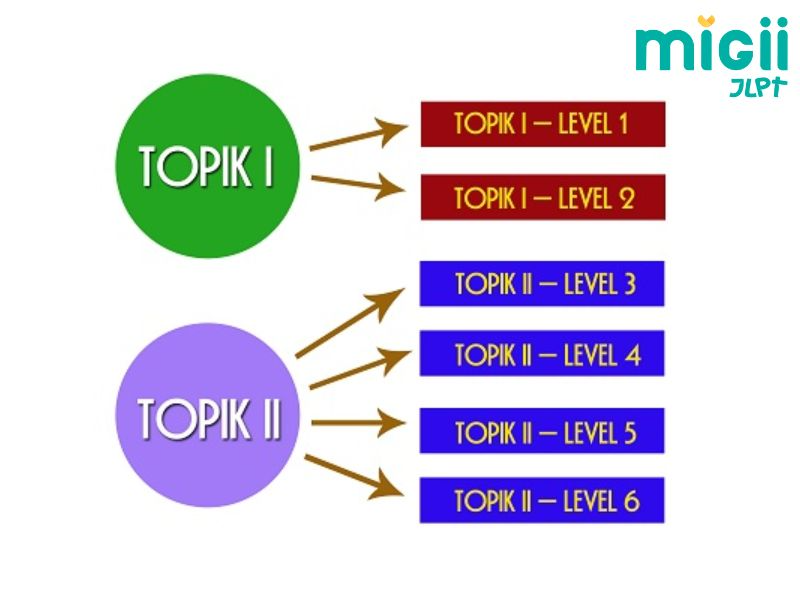
Score Interpretation and Certificate
Tips to Improve Your TOPIK Score
Improving your TOPIK score requires a structured approach to study and practice.
- Time Management Strategies: During the exam, distribute your time carefully. For example, keep TOPIK reading time to around 60 minutes, and don’t spend too long on a single question.
- Focusing on Weak Sections: Identify whether reading, listening, or writing is your weakest skill. Prioritize extra practice in that section to balance your overall TOPIK exam score.
- Practice Using Sample Tests: Mock exams are essential for predicting your TOPIK test scores. They not only reveal your strengths and weaknesses but also prepare you for the exam’s pacing and question style.
By combining smart time management, targeted practice, and consistent review, you can steadily improve your results and aim for higher TOPIK level scores.

Practical tips and strategies to boost your TOPIK score effectively
Frequently Asked Questions (FAQ)
Q1: What is the minimum TOPIK passing score for Level 2?
The TOPIK 1 passing score for Level 2 is 140 points or above.
Q2: How is the TOPIK level 4 score calculated?
A TOPIK level 4 score requires between 150–189 points in TOPIK II.
Q3: How long should I study to achieve a high TOPIK 2 score?
On average, you’ll need 300–500 study hours, depending on your target level and learning pace.
Q4: Can I use the TOPIK score range as a reference for job applications?
Yes. Many Korean companies and institutions use the TOPIK score range to assess applicants’ Korean proficiency for both local and international roles.
Understanding TOPIK scoring is key to success, from the TOPIK 1 passing score to higher TOPIK 2 scores. The Migii TOPIK app provides structured practice, mock tests, and detailed explanations to help you improve your reading, listening, and writing. Start using Migii TOPIK today to confidently track progress and achieve your target TOPIK scoring.




